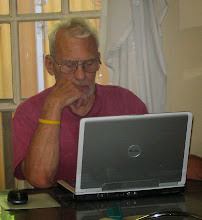The First Debate
I do not mean the Nixon-Kennedy debacle a half century ago. I mean the one that happened on May5, 2011... missed by many who were celebrating the pretend-Mexican holiday Cinco de Mayo.
The Nixon-Kennedy event was won by the make-up artists, or the studio lighting technicians, or some combination thereof.
In those early days of TV, not many realized that a person looked a lot different on the black & white TV screen than they did in the studio. And, in those primitive times, no men wore long hair, few wore earrings and fewer still would wear makeup. Nixon declined makeup and the old kinescope emphasized dark circles under his eyes, making him look ghoul-like.
Is there much difference in the way presidential debate winners are chosen today?
Understanding that TV people are interested only in audience ratings makes it a little easier to understand why they call these sideshows a "debate". They are a question and answer session intended primarily to try to trip someone up and hope they will say something stupid - or, by accident, brilliant. That, my friends, produces sound bytes to last through election day - and which can be revived for years in election campaigns to come.
Think, for a moment, how helpful it would be if first, the host would engage each of the candidates in a little pleasant conversation to help them relax. Having spent 25 years in broadcasting, I can assure you that a broadcaster becomes very comfortable in his job. A political candidate, knowing that one mis-statement could crash his campaign, is anything but comfortable. To march the candidates out in front of a large studio audience and make them stand there, at attention, until you hit them with a question, on a subject that may well be the last thing on their mind, is unlikely to produce anything meaningful. (Like asking former New Mexico Governor Gary Johnson what he would call his TV show - if he ever had a TV show!)
When everyone has had a chance to relax, the host addresses the first candidate: "Candidate one... lately the news media has described you as (whatever is being said). Can you speak to that charge?
Candidate One: Speaks to the subject. (Long enough to clarify his position.)
Host, to other candidates: "Candidate Two, do you have a response to that?"
And, down the line, each candidate has an opportunity to debate what Candidate One has said.
Then the host addresses the next candidate, asking him/her to speak to whatever is being said of them. Following, each remaining candidate is permitted to challenge.
They could then discuss current events or other topics of general interest, with the host simply introducing the topic - not asking specific questions.
We are not hoping to elect the next TV pundit or commentator. We want to elect a chief executive who will keep informed on current events and make thoughtful decisions. How do we benefit from the current format they are calling a debate?
I personally believe the American news media is obstructing the presidential election process. They stage these phony events and if a candidate fails to participate or dares to be critical, he has to wonder if the news people will then disparage everything he says in the remainder of the campaign.
And remember, I am not a media-basher. My career was broadcasting.
Friday, May 06, 2011
Subscribe to:
Post Comments (Atom)

No comments:
Post a Comment